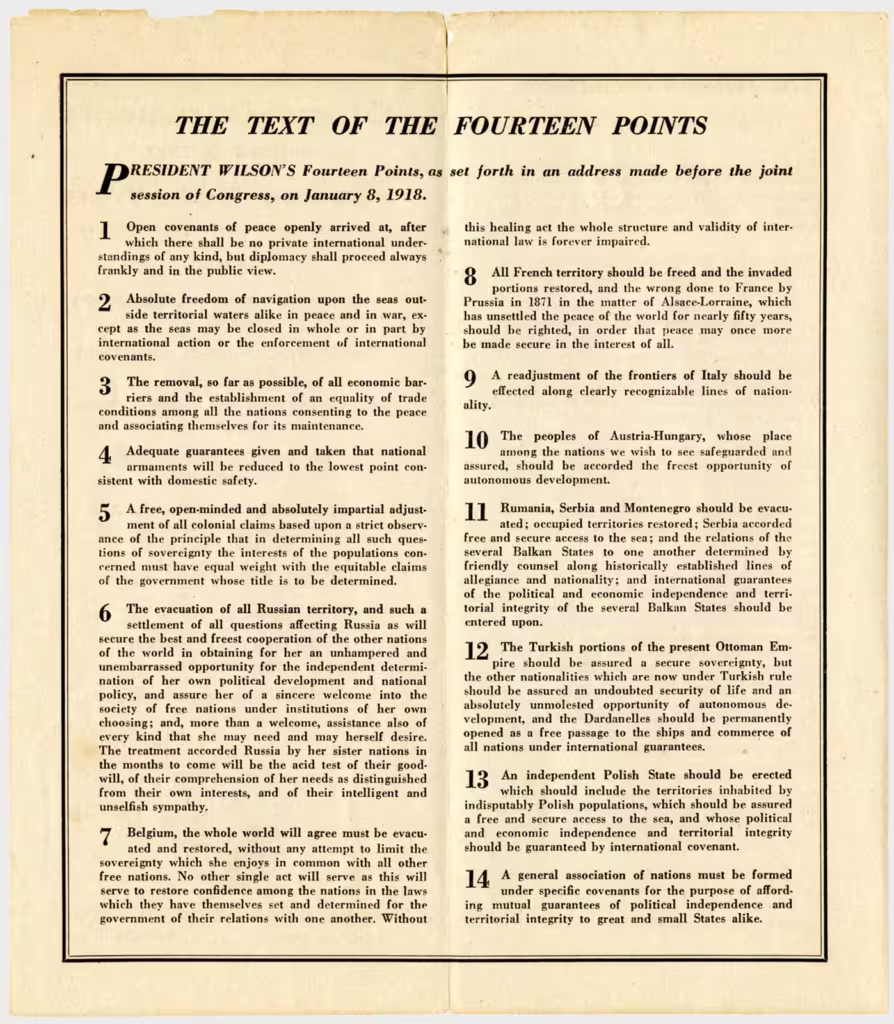In this speech to Congress on January 8, 1918, President Woodrow Wilson proposed a 14-point program for world peace. These points were later taken as the basis for peace negotiations at the end of World War I.
In this speech of January 8, 1918, entitled “War Aims and Peace Terms,” President Wilson laid out 14 points as a blueprint for world peace to be used for peace negotiations after World War I. The details of the speech were based on reports generated by The Inquiry, a group of about 150 political and social scientists organized by Wilson’s longtime adviser and friend Colonel Edward M House. Their task was to study Allied and American policy in almost every region of the globe and to analyze the economic, social, and political facts likely to emerge in the peace conference discussions. The team began its work in secret and eventually produced and collected nearly 2,000 separate reports and documents and at least 1,200 maps.
In his speech, Wilson directly addressed what he saw as the causes of the world war, calling for the abolition of secret treaties, the reduction of armaments, the adjustment of colonial claims in the interests of indigenous peoples and settlers, and freedom of the seas. Wilson also made proposals that would ensure world peace in the future. For example, he proposed the removal of economic barriers between nations, the promise of “self-determination” for oppressed minorities, and a world organization that would provide a system of collective security for all nations. Wilson’s 14 points were designed to undermine the will of the Central Powers to proceed and inspire the Allies to victory. The 14 points were broadcast around the world and fired from rockets and shells behind enemy lines.
When the Allied leaders met at Versailles in France to formulate the treaty ending World War I with Germany and Austro-Hungary, most of Wilson’s 14 points were overruled by the leaders of England and France. To his dismay, Wilson discovered that Britain, France and Italy were mainly interested in making up what they had lost and gaining more by punishing Germany. Germany quickly learned that Wilson’s plan for world peace did not apply to her.
However, Wilson’s climax, calling for a world organization to provide a system of collective security, was included in the Treaty of Versailles. This organization would later be known as the League of Nations. Although Wilson launched a relentless missionary campaign to overcome the US Senate’s opposition to adopting the treaty and joining the League, the treaty was never adopted by the Senate and the United States never joined the League of Nations. Wilson would later suggest that, without American participation in the League, there would have been another world war within a generation.
Transcript
It is our desire and our purpose that the peace processes, when they are commenced, shall be absolutely open and shall not henceforth involve or permit secret understandings of any kind. The day of conquest and aggrandizement is past; so is the day of secret deals made in the interests of certain governments and liable, at an unforeseen moment, to disturb the peace of the world. This happy fact, which is now clear to every public man whose thoughts do not yet linger in an age that is dead and gone, makes it possible for every nation whose aims are consistent with justice and the peace of the world to declare now or at any other time the objects which it has in view.
We have entered this war because violations of law have occurred that have deeply affected us and made the lives of our people impossible unless they were corrected and the world was once and for all assured against their repetition. Therefore, what we are asking in this war is not something specific to us. It is that the world may be made fit and safe to live in, and especially that it may be made safe for every peace-loving nation which, like our own, desires to live its own life, to establish its own institutions, to be assured of justice and fair treatment from the other peoples of the world against selfish force and aggression. All the peoples of the world are, in fact, partners in this interest, and as far as we are concerned, we see very clearly that if justice is not done to others, it will not be done to us. Therefore, the program of world peace is our program; and that program, the only possible program, as we see it, is this:
I. Open peace agreements, openly arrived at, after which there will be no private international understandings of any kind, but diplomacy will always be conducted frankly and in public.
II. Absolute freedom of navigation on the seas, outside territorial waters, both in time of peace and in time of war, except when the seas may be closed in whole or in part by international action for the enforcement of international covenants.
III. The elimination, as far as possible, of all economic barriers and the establishment of equal terms of trade among all nations consenting to peace and associating for the maintenance of peace.
IV. Adequate guarantees given and taken that national armaments will be reduced to the lowest level compatible with internal security.
V. A free, open, and absolutely impartial adjustment of all colonial claims, based on strict adherence to the principle that in the determination of all such questions of sovereignty the interests of the populations concerned must have equal weight with the equitable claims of the government whose title is to be settled.
VI. The evacuation of all Russian territory and the settlement of all questions concerning Russia so as to secure the best and freest cooperation of the other nations of the world in securing for Russia a free and unimpeded opportunity to determine independently her own national political and political development, and to secure for her a sincere welcome into the society of free nations under institutions of her own choosing; and, more than a welcome, assistance of every kind she may need and desire. The treatment accorded to Russia by the sister nations in the months to come will be the decisive test of their good will, of their understanding of her needs in relation to their own interests, and of their intelligent and unselfish sympathy.
VII. Belgium, the whole world will agree, must be evacuated and restored, without any attempt to limit the sovereignty which she enjoys in common with all other free nations. No other act will serve like this to restore the confidence of nations in the laws which they themselves have established and determined for the government of their mutual relations. Without this healing act the whole structure and validity of international law is forever impaired.
VIII. All French territories should be liberated and the portions invaded should be restored, and the wrong done to France by Prussia in 1871 in the Alsace-Lorraine question, which disturbed the peace of the world for nearly fifty years, should be repaired, so that peace may again be secured in the interests of all.
IX. A readjustment of the frontiers of Italy should be effected along clearly recognized lines of nationality.
X. The peoples of Austro-Hungary, whose place among the nations we wish to see protected and secured, should be given the freest opportunity for autonomous development.
XI. Romania, Serbia, and Montenegro should be evacuated; the occupied territories should be restored; Serbia should be given free and safe access to the sea; the relations between the several Balkan states should be determined by a friendly council, along historically established lines of loyalty and nationality; and international guarantees of the political and economic independence and territorial integrity of the several Balkan states should be concluded.
XII. The Turkish part of the present Ottoman Empire should enjoy secure sovereignty, but the other nationalities at present under Turkish rule should be assured of undoubted security of life and an absolutely unimpeded possibility of autonomous development, and the Dardanelles should be permanently opened as a free passage for the ships and commerce of all nations, under international guarantees.
XIII. An independent Polish state should be created, including the territories inhabited by indisputably Polish populations, to which free and secure access to the sea should be ensured, and whose political and economic independence and territorial integrity should be guaranteed by international conventions.
XIV. A general association of nations should be formed on the basis of specific conventions, with the purpose of providing reciprocal guarantees of political independence and territorial integrity to large and small states alike.
In these essential rectifications of wrongs and assertions of rights, we feel ourselves close partners of all associated governments and peoples against the imperialists. We cannot be separated in interests or divided in aims. We stand together to the end.
We are willing to fight and to continue to fight for such agreements and understandings until they are achieved; but only because we want right to prevail and we want a just and stable peace, such as can only be secured by the elimination of the main provocations to war, which this program eliminates. We are not jealous of Germany’s greatness, and there is nothing in this program that affects it. We bear her no grudge for any achievements or distinctions in learning or peaceful enterprise, such as have made her record very brilliant and very enviable. We do not wish to injure her or in any way block her legitimate influence or power. We do not wish to fight her either with arms or with hostile trade agreements, if she is willing to associate with us and the other peace-loving nations of the world in agreements of justice, law and fair treatment. We only wish her to accept a place of equality among the peoples of the world – the new world in which we now live – instead of a place of domination.


 Română
Română Magyar
Magyar